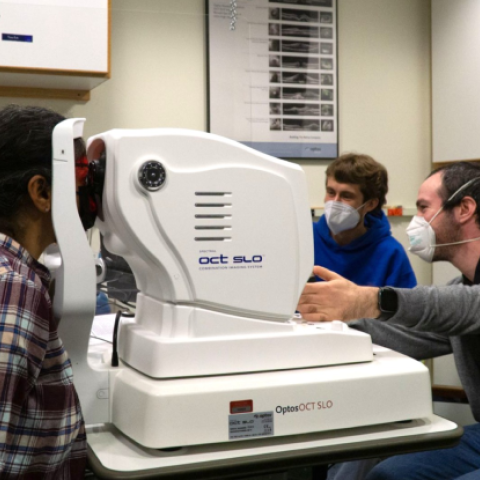

- Principal Investigator:
- Preeti Verghese
The Smith-Kettlewell Eye Research Institute (SKERI) is an NEI Institutional Training Grant Awardee. The grant was awarded to provide postdoctoral training in basic and clinical science relevant to translational vision research and rehabilitation. Thirteen faculty whose expertise spans the areas of spatial and binocular vision, eye movements, strabismus, central vision loss, computer vision and assistive technology will train postdoctoral fellows seeking to specialize in translational vision research and rehabilitation. Research training goals will be accomplished through intensively supervised research projects, frequent and wide-ranging seminars, journal clubs and colloquia, as well as supervised research performance, proposal development and grant writing. Because the vast majority of SKERI Faculty are full-time researchers with no teaching duties and small laboratories, the Fellows experience a great deal of direct interaction with their sponsors. In addition, the Fellows have available to them many opportunities for interaction with the rest of the Faculty, which include basic, clinician and rehabilitation researchers. These interactions are facilitated by the group all being housed within the same building and all working in clinically relevant vision research. The Faculty-Fellow interactions represent all areas of the research process: proposal, critique, performance, and communication of findings through the writing of papers and preparation of presentations, as well as participation in scientific and ethics seminars. Importantly, Fellows are also in frequent contact with each other through organized events, adjacent open work-spaces, and the numerous Faculty-Faculty collaborations. The Fellowship program forms a critical component of the research vitality and capacity of SKERI. Because SKERI is not a degree-granting institution, its investigators do not typically have graduate students. It is widely appreciated within the Institute that Fellows bring in new ideas and techniques to the preceptors’ laboratories. The process of training Fellows encourages Faculty to challenge old assumptions, to develop clear and concise descriptions of why a given research activity is of significance, and to expand the range of approaches to research problems. The T32 Program will significantly augment SKERI’s internally funded Rachel C. Atkinson Fellowship, C.V. Starr Scholarship Program, and individual Fellowship awards from other sources to yield an overall program size of approximately 6-7 post-doctoral fellows.

